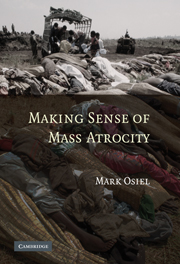Crossref Citations
This Book has been
cited by the following publications. This list is generated based on data provided by Crossref.
2009.
Necessary Evils.
p.
249.
Jain, Neha
2010.
Developing a New Structural Framework for Parties to an International Crime: Toward a Capacious Concept of Principalship.
Proceedings of the ASIL Annual Meeting,
Vol. 104,
Issue. ,
p.
261.
Newton, Michael A.
2010.
The Quest for Constructive Complementarity.
SSRN Electronic Journal,
Ainley, Kirsten
2011.
Excesses of Responsibility: The Limits of Law and the Possibilities of Politics.
Ethics & International Affairs,
Vol. 25,
Issue. 4,
p.
407.
Newton, Michael A.
2011.
The International Criminal Court and Complementarity.
p.
304.
Kyriakakis, Joanna
2012.
Developments in international criminal law and the case of business involvement in international crimes.
International Review of the Red Cross,
Vol. 94,
Issue. 887,
p.
981.
Stephen, Christopher
2012.
INTERNATIONAL CRIMINAL LAW: WIELDING THE SWORD OF UNIVERSAL CRIMINAL JUSTICE?.
International and Comparative Law Quarterly,
Vol. 61,
Issue. 1,
p.
55.
Verdeja, Ernesto
2012.
The Political Science of Genocide: Outlines of an Emerging Research Agenda.
Perspectives on Politics,
Vol. 10,
Issue. 2,
p.
307.
Newton, Michael A.
2013.
<I>Jus Post Bellum</I> and Transitional Justice.
p.
74.
Jain, Neha
2013.
Individual Responsibility for Mass Atrocity: In Search of a Concept of Perpetration.
American Journal of Comparative Law,
Vol. 61,
Issue. 4,
p.
831.
Thaler, Mathias
2014.
Neo-Grotian predicaments: On Larry May’s theory of international criminal law.
Journal of International Political Theory,
Vol. 10,
Issue. 3,
p.
345.
2014.
Radovan Karadžič.
p.
1.
Espindola, Juan
2014.
The Case for the Moral Permissibility of Amnesties: An Argument from Social Moral Epistemology.
Ethical Theory and Moral Practice,
Vol. 17,
Issue. 5,
p.
971.
Neumann, Klaus
2014.
A Companion to Global Historical Thought.
p.
466.
Graver, Hans Petter
2015.
Judges Against Justice.
p.
15.
Wilke, Christiane
2015.
Law on a Slanted Globe.
Social & Legal Studies,
Vol. 24,
Issue. 4,
p.
555.
Schneider, Gerald
Banholzer, Lilli
and
Albarracin, Laura
2015.
Ordered Rape.
Violence Against Women,
Vol. 21,
Issue. 11,
p.
1341.
Accatino, Daniela
and
Collins, Cath
2016.
Truth, Evidence, Truth: The Deployment of Testimony, Archives and Technical Data in Domestic Human Rights Trials.
Journal of Human Rights Practice,
Vol. 8,
Issue. 1,
p.
81.
Kim, Sangkul
2016.
A Collective Theory of Genocidal Intent.
Vol. 7,
Issue. ,
p.
13.
Kim, Sangkul
2016.
A Collective Theory of Genocidal Intent.
Vol. 7,
Issue. ,
p.
171.



